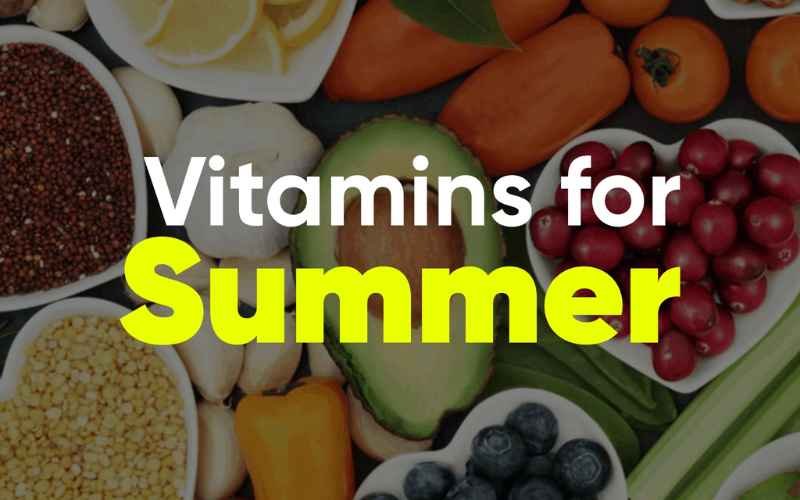Summer is a time of sunshine, outdoor activities, and enjoying the warmth. However, the increased exposure to sun and heat can also lead to dehydration, skin issues, and fatigue. To stay healthy and energized during this season, it’s crucial to focus on your vitamin intake.

Here are four essential vitamins you should prioritize during the summer months.
1. Vitamin D
Importance:
- Sunshine Vitamin:
- Production: Vitamin D, often referred to as the “sunshine vitamin,” is synthesized in the skin in response to exposure to ultraviolet B (UVB) rays from sunlight.
- Bone Health: It is essential for maintaining healthy bones and teeth. Vitamin D facilitates the absorption of calcium and phosphorus in the intestines, which are critical for bone formation and mineralization. Without sufficient vitamin D, bones can become thin, brittle, or misshapen.
- Immune Support:
- Pathogen Defense: Vitamin D plays a significant role in enhancing the pathogen-fighting effects of the immune system. It helps activate and regulate the immune responses by promoting the activity of monocytes and macrophages, white blood cells that are key players in defending the body against pathogens.
- Inflammation Control: It also helps modulate the inflammatory response, ensuring that the body’s reaction to infections is effective without becoming excessive and damaging to the tissues.
Sources:
- Sunlight:
- Exposure: Spending 10-30 minutes in the midday sun several times a week can help maintain adequate levels of vitamin D. The duration may vary depending on skin type, geographic location, and season.
- Considerations: Factors such as the use of sunscreen, clothing, skin pigmentation, age, and the amount of UVB radiation reaching the skin (which can be affected by time of day, latitude, and weather conditions) can influence vitamin D synthesis.
- Food:
- Natural Sources: Fatty fish such as salmon, mackerel, and sardines are excellent sources of vitamin D. Egg yolks also contain small amounts of vitamin D.
- Fortified Foods: Many dairy products, plant-based milk alternatives, and cereals are fortified with vitamin D to help people meet their nutritional needs.
- Supplements: For those who may not get enough vitamin D from sunlight and food alone, supplements can be a useful option to ensure adequate intake. Vitamin D2 (ergocalciferol) and D3 (cholecalciferol) are the two main forms used in supplements, with D3 generally being more effective in raising blood levels of the vitamin.
Tips:
- Moderate Sun Exposure: Aim for moderate sun exposure to boost vitamin D production while minimizing the risk of skin damage. The balance is crucial, as excessive UV exposure can increase the risk of skin cancer.
- Sunscreen Use: When spending extended periods in the sun, apply sunscreen to protect your skin from harmful UV rays. Sunscreen can reduce vitamin D production, so it’s important to find a balance between sun protection and vitamin D synthesis.
- Dietary Intake: Include vitamin D-rich foods in your diet regularly. For individuals with limited sun exposure, such as those living in higher latitudes or spending most of their time indoors, fortified foods and supplements can be particularly important.
- Monitoring Levels: Regularly check your vitamin D levels, especially if you are at risk for deficiency due to factors like limited sun exposure, darker skin, age, or certain health conditions. Healthcare providers can offer guidance on appropriate supplementation if needed.
2. Vitamin C
Importance:
- Antioxidant Power:
- Protective Role: Vitamin C acts as a potent antioxidant, helping to neutralize free radicals generated by exposure to UV radiation, pollution, and other environmental stressors.
- Skin Health: By scavenging free radicals, vitamin C helps protect the skin from oxidative damage, which can lead to premature aging, wrinkles, and other skin concerns.
- Collagen Production:
- Collagen Synthesis: Vitamin C is crucial for the biosynthesis of collagen, a structural protein found in connective tissues, skin, cartilage, and bones.
- Skin Elasticity: Collagen provides structural support and elasticity to the skin, helping to maintain its firmness, smoothness, and resilience.
- Wound Healing: Vitamin C plays a vital role in wound healing by promoting collagen formation, which is essential for tissue repair and regeneration.
Sources:
- Fruits:
- Citrus Fruits: Oranges, lemons, grapefruits, and limes are excellent sources of vitamin C.
- Berries: Strawberries, raspberries, blueberries, and cranberries are rich in vitamin C and other antioxidants.
- Tropical Fruits: Kiwi, mangoes, papaya, and pineapple also provide significant amounts of vitamin C.
- Vegetables:
- Bell Peppers: Especially red and yellow bell peppers are among the richest sources of vitamin C.
- Cruciferous Vegetables: Broccoli, cauliflower, Brussels sprouts, and cabbage contain vitamin C along with other beneficial nutrients.
- Leafy Greens: Spinach, kale, Swiss chard, and other leafy greens contribute to vitamin C intake and offer additional health benefits.
Tips:
- Dietary Diversity: Incorporate a variety of fruits and vegetables into your meals to ensure a consistent intake of vitamin C and other essential nutrients.
- Fresh and Raw: To maximize vitamin C content, consume fruits and vegetables raw or minimally processed. Cooking methods such as boiling can lead to vitamin C loss due to heat sensitivity.
- Storage: Store fruits and vegetables properly to preserve their vitamin C content. Keep them refrigerated, and avoid prolonged exposure to light and air, which can degrade the vitamin.
- Supplementation: In some cases, supplementation may be necessary, especially for individuals with dietary restrictions, limited access to fresh produce, or increased vitamin C requirements due to certain health conditions or lifestyle factors. Consult a healthcare professional before starting any supplementation regimen.
3. Vitamin E
Importance:
- Skin Health:
- Antioxidant Protection: Vitamin E is renowned for its potent antioxidant properties, which help combat oxidative stress caused by exposure to UV radiation, pollution, and other environmental factors.
- Cellular Defense: By neutralizing free radicals, vitamin E protects skin cells from damage, thereby reducing the risk of premature aging, wrinkles, and other skin issues.
- Moisturizing Properties:
- Hydration Maintenance: Vitamin E contributes to skin hydration by helping to maintain the skin’s natural moisture barrier.
- Barrier Function: It forms a protective barrier on the skin’s surface, preventing moisture loss and enhancing skin softness and smoothness.
- Sun Protection: While it does not replace the need for sunscreen, vitamin E’s moisturizing properties can provide an additional layer of protection against dryness and sunburn.
Sources:
- Nuts and Seeds:
- Almonds: Almonds are one of the richest sources of vitamin E, providing a significant portion of the daily recommended intake in just a small serving.
- Sunflower Seeds: These seeds are another excellent source of vitamin E, offering a range of other nutrients as well.
- Hazelnuts: Hazelnuts are rich in vitamin E and can be enjoyed as a snack or added to various dishes for extra flavor and nutrition.
- Oils:
- Sunflower Oil: Cold-pressed sunflower oil is a popular cooking oil that contains high levels of vitamin E. It can be used for sautéing, frying, baking, or as a salad dressing.
- Wheat Germ Oil: This oil is particularly rich in vitamin E and can be used sparingly as a nutritional supplement or added to foods for its flavor and health benefits.
- Olive Oil: Extra virgin olive oil is not only a source of healthy fats but also contains vitamin E, making it a versatile and nutritious option for cooking and dressing salads.
Tips:
- Dietary Incorporation: Include vitamin E-rich foods such as nuts, seeds, and oils in your daily diet to ensure an adequate intake of this essential nutrient.
- Cooking and Salad Dressing: Use vitamin E-rich oils like sunflower oil, wheat germ oil, and olive oil in your cooking and salad dressings to boost your vitamin E intake.
- Moderation: While vitamin E is beneficial for skin health, it’s essential to consume it as part of a balanced diet. Avoid excessive intake of vitamin E supplements, as high doses may have adverse effects.
- Sun Protection: While vitamin E offers some protection against UV damage, it’s not a substitute for sunscreen. Continue to use sunscreen regularly to protect your skin from harmful UV rays.
4. Vitamin A
Importance:
- Skin Repair:
- Cellular Regeneration: Vitamin A plays a vital role in supporting the production and regeneration of skin cells, which is essential for repairing damaged skin tissue.
- Wound Healing: It promotes the healing of wounds and cuts by stimulating the growth of new skin cells and tissues.
- Skin Health Maintenance: Vitamin A helps maintain the integrity of the skin’s barrier function, preventing moisture loss and protecting against environmental stressors.
- Vision Health:
- Retinal Function: Vitamin A is a key component of rhodopsin, a protein in the retina of the eye that enables vision in low-light conditions.
- Night Vision: Adequate vitamin A intake is essential for maintaining optimal night vision, especially crucial for driving or activities in low-light environments.
- Eye Health: Vitamin A also supports the health of the cornea and other structures in the eye, contributing to overall vision health and clarity.
Sources:
- Vegetables:
- Carrots: Carrots are well-known for their high beta-carotene content, a precursor of vitamin A. Beta-carotene is converted into vitamin A in the body.
- Sweet Potatoes: These root vegetables are rich in beta-carotene and provide a significant portion of the daily recommended intake of vitamin A.
- Leafy Green Vegetables: Spinach, kale, and other leafy greens contain beta-carotene along with other essential nutrients, making them excellent choices for promoting skin and eye health.
- Fruits:
- Apricots: Apricots are a good source of beta-carotene and vitamin A, offering a sweet and nutritious addition to your diet.
- Mangoes: Mangoes are not only delicious but also rich in beta-carotene, making them a flavorful way to boost your vitamin A intake.
- Cantaloupe: This melon variety is high in beta-carotene and provides hydration along with essential vitamins and minerals.
Tips:
- Colorful Diet: Incorporate a variety of colorful fruits and vegetables into your meals to ensure a diverse intake of vitamin A and other beneficial nutrients.
- Cooking Methods: To preserve the vitamin A content in vegetables, consider lightly steaming or sautéing them instead of boiling, which can leach out water-soluble vitamins.
- Snacking: Enjoy vitamin A-rich fruits like apricots and mangoes as healthy snacks throughout the day to satisfy your sweet cravings while nourishing your body.
- Balanced Intake: Aim for a balanced diet that includes a mix of vitamin A-rich foods along with other essential nutrients to support overall health and well-being.
Conclusion
Ensuring you get enough of these essential vitamins can help you stay healthy, energetic, and protect your skin during the summer months. Remember to balance sun exposure with skin protection, and focus on a diet rich in fruits, vegetables, nuts, and healthy oils. Stay hydrated, eat well, and enjoy the vibrant summer season!















